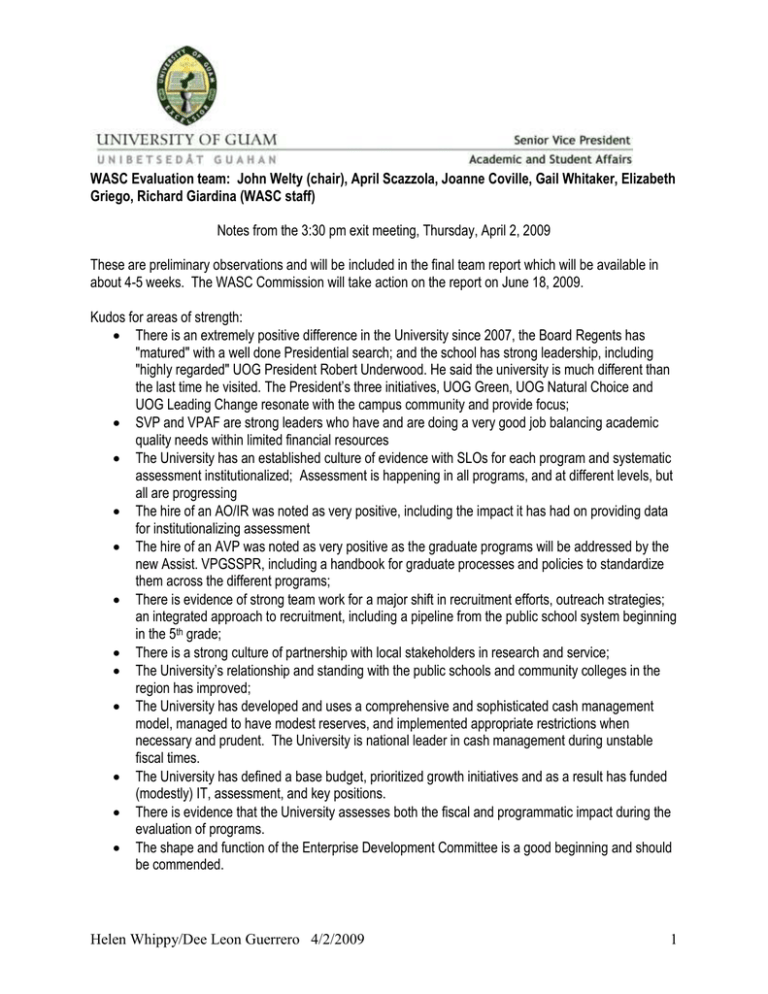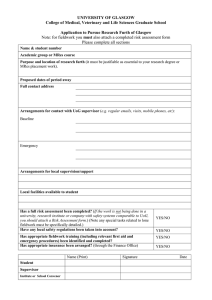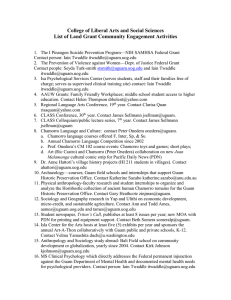WASC Evaluation team: John Welty (chair), April Scazzola, Joanne... Griego, Richard Giardina (WASC staff)
advertisement

WASC Evaluation team: John Welty (chair), April Scazzola, Joanne Coville, Gail Whitaker, Elizabeth Griego, Richard Giardina (WASC staff) Notes from the 3:30 pm exit meeting, Thursday, April 2, 2009 These are preliminary observations and will be included in the final team report which will be available in about 4-5 weeks. The WASC Commission will take action on the report on June 18, 2009. Kudos for areas of strength: There is an extremely positive difference in the University since 2007, the Board Regents has "matured" with a well done Presidential search; and the school has strong leadership, including "highly regarded" UOG President Robert Underwood. He said the university is much different than the last time he visited. The President’s three initiatives, UOG Green, UOG Natural Choice and UOG Leading Change resonate with the campus community and provide focus; SVP and VPAF are strong leaders who have and are doing a very good job balancing academic quality needs within limited financial resources The University has an established culture of evidence with SLOs for each program and systematic assessment institutionalized; Assessment is happening in all programs, and at different levels, but all are progressing The hire of an AO/IR was noted as very positive, including the impact it has had on providing data for institutionalizing assessment The hire of an AVP was noted as very positive as the graduate programs will be addressed by the new Assist. VPGSSPR, including a handbook for graduate processes and policies to standardize them across the different programs; There is evidence of strong team work for a major shift in recruitment efforts, outreach strategies; an integrated approach to recruitment, including a pipeline from the public school system beginning in the 5th grade; There is a strong culture of partnership with local stakeholders in research and service; The University’s relationship and standing with the public schools and community colleges in the region has improved; The University has developed and uses a comprehensive and sophisticated cash management model, managed to have modest reserves, and implemented appropriate restrictions when necessary and prudent. The University is national leader in cash management during unstable fiscal times. The University has defined a base budget, prioritized growth initiatives and as a result has funded (modestly) IT, assessment, and key positions. There is evidence that the University assesses both the fiscal and programmatic impact during the evaluation of programs. The shape and function of the Enterprise Development Committee is a good beginning and should be commended. Helen Whippy/Dee Leon Guerrero 4/2/2009 1 Preliminary Recommendations: For years there has been difficulty in receiving full funding and local cash and deficit issues. UOG should continue to be closely involved with government leaders and include the community in a discussion to agree on a funding plan and adequate budget with timely allotment payments to resize, redirect, and realign the base budget. UOG must take the next step in deciding what should make up the program portfolio offered to students, including discontinuation of programs. Proceed with the program sustainability outcomes. UOG should continue to diversify funding by finding new revenue sources and entrepreneurial development. Research should be supported, esp. research in the region and that involving faculty and graduate students working together on problems and programs. The quality of graduate programs review has begun and should continue to address the quality and consistency of graduate requirements, procedures and policies across the campus. In the region, UOG needs to update comprehensive articulation agreements with all community colleges and track transfer students to see how well they do in programs and courses and provide support where needed. UOG should expand the link with K-12 to higher education. UOG graduation rates need improvement and student retention rates need attention. Recommend a University-wide retention committee and targeted retention interventions. UOG should undertake comprehensive strategic planning for the Guam build up, incorporating internal and external dialogue. The University should decide on the relative priority and emphasis to be placed on professional programs and the liberal arts. UTAC brings together a diverse group to consider IT needs and policies. Find ways to fund DE to ensure quality and curricular integrity. UOG should use and advance alternative delivery models for education and course delivery, and find ways of funding these modes of delivery to take full advantage of the position of the island in the western Pacific and in the build up. Student learning is evident on the campus and in courses and programs. The next step is to document the learning over time, program by program. New models for administration and governance such as the division chairs and the AOC should be carefully defined as to their respective roles in providing advice, decision-making or review at the University. The decision-making matrix and a review of the function of various councils would assist in including all constituencies at various levels. UOG should work with GCC in areas such as remedial education and articulation of complementary programs such as nursing. The Enterprise planning committee should continue to collaborate with interested partners, including the community colleges to enhance and encourage self-supporting academic programs in the region. This group needs to develop clear guidelines on policies and procedures such as set charges and revenue-sharing. END Helen Whippy/Dee Leon Guerrero 4/2/2009 2


